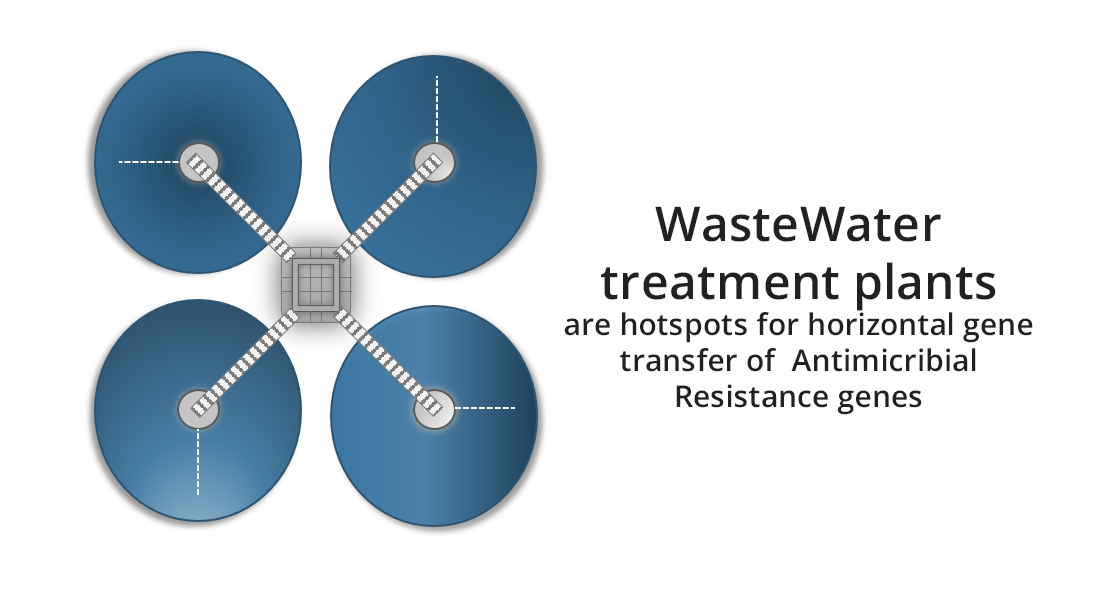SandBAR -Strategies and Barriers to avoid the spread of Antibiotic Resistance genes during Wastewater Treatment.
SandBAR is the first comprehensive initiative to investigate how wastewater treatment plants (WWTP) affect the transfer and occurrence of antimicrobial resistance (AMR) to and in human pathogens.

In SandBAR we will examine how plasmids and genes encoding AMR spread, persist or are eliminated from WWTPs and how this effects their occurrence in pathogens. We will identify traits of the WWTP microbial communities that promote HGT and the spread of ARGs.
SandBAR - Strategies and Barriers to avoid the spread of Antibiotic Resistance genes during Wastewater Treatment
SandBAR is the first comprehensive initiative to investigate how wastewater treatment plants (WWTP) affect the transfer and occurrence of antimicrobial resistance (AMR) to and in human pathogens.
Background and aim
Increased AMR in human pathogens is an acute public health threat. Human pathogens resistant to methicillin, fluoroquinolones, penicillin or third-generation cephalosporins are already major threats to human health. A profound example is the emergence of so-called extended spectrum β-lactamase (ESBL) pathogens and carbapenem resistant enterobacteria (CREs): their resistance to all β-lactam antibiotics (pencillins, cephalosporins, carbapenems) can make a CRE infection fatal.
This rapid spread of antimicrobial resistance genes (ARGs) is in large part due to the fact that ARGs are often located on mobile genetic elements (MGEs) such as plasmids, which can be rapidly disseminated between microorganisms via horizontal gene transfer (HGT). Hence, systems that host high microbial abundance and receive significant influent og AMR organisms likely promote transfer of ARG plasmids. WWTPs are one such hotspot and as traditional WWTPs are not designed for removal of ARGs; they may actually promote HGT.
In SandBAR we will examine how plasmids and genes encoding AMR spread, persist or are eliminated from WWTPs and how this effects their occurrence in pathogens. We will identify traits of the WWTP microbial communities that promote HGT and the spread of ARGs. SandBAR will reveal relevant microbial groups and MGEs that facilitate spread of antibiotic resistance traits from and to human pathogens and we will identify WWTP conditions and configurations that serve as barriers for transfer.
Gains and perspectives
WWTPs are crucial for the fate of Antimicribial Resistance genes (ARGs) especially as urban water usage is becoming ever more circular and the gab between wastewater treatment and potable water production is shrinking, with efforts targeting reuse. Considering the acute global public-health threat posed by AMR, the obvious load of human waste-born AMR to the sewer systems, and the increase in wastewater reuse this study is a critical step in evaluating the potential burden or mitigation opportunities of the wastewater treatment towards AMR dissemination.
Consortium Coordinator
Professor Barth Smet
Technical University of Denmark
Department of Environmental Engineering
Professor Søren Johannes Sørensen
 I am currently team leader for a group of 12 scientists, 11 phd’s, three technicians and ten master students applying molecular techniques in microbial ecological studies at the Section of Microbiology. My research focuses on social interactions in microbial populations. My group’s studies evaluate the extent of genetic flow within natural communities and their response to environmental perturbations.
I am currently team leader for a group of 12 scientists, 11 phd’s, three technicians and ten master students applying molecular techniques in microbial ecological studies at the Section of Microbiology. My research focuses on social interactions in microbial populations. My group’s studies evaluate the extent of genetic flow within natural communities and their response to environmental perturbations.
The section houses state of the art culture independent experimental infrastructure that enables us to examine how microbes interact at a scale that is relevant for such small organisms and to examine and identify the roles of the individual species that contribute to these interactions.
We investigate how microbes work together in in their natural state such as biofilms and the effect this has on microbial communities in in vivo systems such as human or animal gut, soil, or phase change communities. These are related to our in vitro model systems such as our bioflux biofilm system where we can evaluate our findings and examine phenomenon such as horizontal gene transfer or emergent community properties and evolutionary strategies. To do so we use techniques such as high throughput sequencing, flow cytometry and ultra-high resolution bioimaging or confocal microscopy and microbial reporter systems.
The pioneering work of the section has had been recognized for its impact in diverse areas in which microbial interactions are critical. These include, Soil biodiversity and bioremediation, the role of horizontal gene transfer, human disease progression, the effects of species diversity in plant animal and environmental microbiomes, how microbes interact in evolutionary strategies and the significance of cooperation verses antagonism in microbial systems.
Working in these areas necessitates close collaboration with international scientists from around the world that come to the section and to whom members of the section visit in scientific exchange programs. They span all corners of the globe including Dr. Duncan Veal, Macquarie University, Sydney Australia, Prof A. Spormann, Stanford University, Prof. S. Kjelleberg, University of NSW; Prof. M. Schloter, Helmholtz Zentrum München; and Prof. Md Hans Bisgaard COPSAC back here in Denmark.
These collaborations have helped more than 20 postdocs and 30 past Ph.D. fellows follow their career path both here and around the world to obtain successful positions in both academia and research.
Researchers
| Name | Title | Phone | |
|---|---|---|---|
| Search in Name | Search in Title | Search in Phone |
Section of Microbiology

Funded by:
The Danish Counsil for independent Research - Technology and Production Grant
Project title: SandBAR - Strategies and Barriers to avoid the spread of Antibiotic Resistance genes during Wastewater Treatment.
Project period: 01.07.2017 - 31.12.2020
Contact
 Professor
Professor
Søren J. Sørensen
Universitetsparken 15
Building 1, 1st floor
DK-2100 Copenhagen
Email: sjs@bio.ku.dk
External members:
| Name | Title | Phone | |
|---|---|---|---|
| Test Testesen | PhD fellow | +45 353-20566 | |
| Forsker Forskersen | Associate professor | +45 353-30148 |

